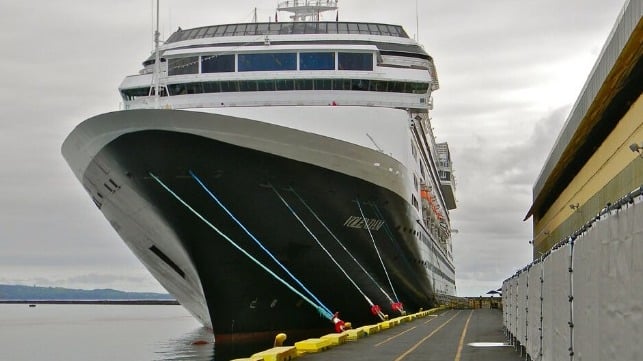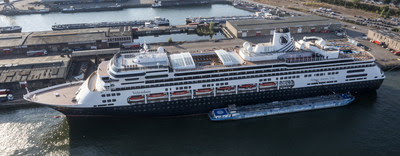Holland America’s Volendam Completes First Sustained Biofuel Test

The first sustained test of biofuels for a cruise ship was recently completed by Carnival Corporation’s Holland America Line while its cruise ship was in Rotterdam. According to the companies which worked with supplier GoodFuels this along with a previous fueling for AIDA represented the first live tests on working cruise ships.
The companies took the opportunity to test the biofuel made from feedstocks that are certified as 100 percent waste or residue while the 61,300 gross ton Volendam was docked in Rotterdam on a long-term charter to provide housing for Ukrainian refugees. According to Holland America, the test lasted for 20 days. Wartsila also participated in the test along with GoodFuels that supplied the drop-in to the vessel.
In the first five days of the test, the ship used a mix of 30 percent biofuel and 70 percent marine gas oil (MGO) in one of its main auxiliary engines. For the final 15 days of testing, which was completed on September 7, the ship used 100 percent biofuel. According to GoodFuels, there was a 78 percent decrease in lifecycle CO2 emissions during the final 15 days of the trial compared to marine gas oil emissions.
"We were excited to have this opportunity to test a next-generation fuel resource on a Holland America Line ship, and we are very encouraged by the results," said Gus Antorcha, president of Holland America Line. "As part of our commitment to sustainability, we have always looked for cutting-edge solutions to environmental challenges that will help us meet Carnival Corporation's sustainability goals over the coming decades."
The Dutch-flagged Volendam was selected for the test since it was located at the Port of Rotterdam, one of the global ports where GoodFuels operates the infrastructure necessary to provide biofuel waterside fueling services. There is no significant difference for the ship's team members in handling regular fuel oil versus biofuel. The use of a "drop-in" biofuel such as the one tested on the Volendam required no shipboard refitting or special equipment.

Volendam with the biofuel bunker barge alongside (Holland America)

that matters most
Get the latest maritime news delivered to your inbox daily.
Since March, the cruise ship had been operating on charter to the City of Rotterdam to provide housing so the fuel test was done at the dock while the ship was only using engines for the hotel load and not propulsion. She completed the charter and departed Rotterdam on September 14 bound for Trieste, Italy where she will depart on her first cruise since before the pandemic-related pause in cruise operations two and a half years ago.
It was the second biofuel test conducted by the brands of Carnival Corporation. In July, the AIDAprima was loaded with a biofuel blend during a port call in Rotterdam. After the first test, the companies said that it also provided a blueprint for the wider cruise sector on how to accelerate the adoption of alternative fuels in large-scale passenger ships. Following the first bio-bunkering, follow-up deliveries were envisioned by AIDA Cruises, as well as a potential for expansion to other brands under the Carnival Corporation banner.
